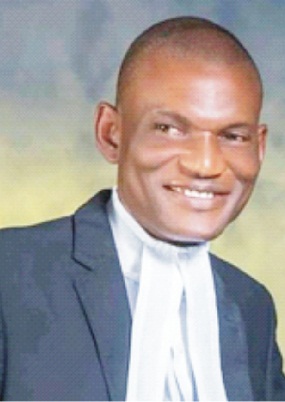Is executive order a law?
By Bamidele Kolawole
|
Executive Order – According to the Black’s Law Dictionary is defined as an order issued by or on behalf of the President, usually intended to direct or instruct the actions of executive agencies or government officials, or to set policies for the executive branch to follow.

Executive Orders can be described as a rule of order issued by the head of the executive arm of government such as the President or the governor of a state to the executive branch of government and having the force of law.
They have full legal effect. It is a specie of subsidiary or delegated legislation. You know the main function of the legislature is to make laws for the good governance of the people in any given society. Modern legislature cannot make all the laws for all ramifications of human endeavours.
So the power to make law is delegated to other bodies, institutions and agencies for effective legislations particularly those that need the inputs of experts. Delegated legislation is also useful when there is the need to urgently meet or deal with an emergency situation.
So, Executive Order is one of the laws in force that came into existence through the process of delegated legislation. Take notice that the President derives his power to issue Executive Order from the Constitution.
The Constitution on the other hand is a product of the legislature. So we can say comfortably that Executive Order is a delegated legislation which has the force of law just like the main legislation made by the legislature.

Executive Order – According to the Black’s Law Dictionary is defined as an order issued by or on behalf of the President, usually intended to direct or instruct the actions of executive agencies or government officials, or to set policies for the executive branch to follow.
Executive orders have their origin in the United States of America. The first executive order was issued by George Washington on June 8, 1789, addressed to the heads of the federal departments, instructing them “to impress me with a full, precise, and distinct general idea of the affairs of the United States” in their fields.
With the exception of William Henry Harrison, all presidents beginning with George Washington in 1789 have issued orders that in general terms can be described as executive orders. Initially they took no set form. Consequently, such orders varied as to form and substance.
Section 5 of the 1999 Constitution of Nigeria as amended vests executive powers in the President and requires that the President shall ensure that the Laws are faithfully executed, Laws can give additional power to the President, a command issued to a set or group of people, executive agent under the executive arm of the government.
Governor of States can also exercise executive order – section 5 (2) of the 1999 constitution as amended.
Executive shows that it must be from the executive and not otherwise, this clearly depicts the fact that, it must emanate from any member of the executive who is so recognised by law to do so and it is important that it must align with the provision of the law, otherwise the court can set it aside.
Executive Orders are numbered consecutively, may be referred to by the number or assigned topic, i.e Executive order 10
The Order becomes legally binding only when the President acts within the boundaries of his constitutional/ statutory authority.
The enabling legislative or constitutional authority may empower the president to use Executive Orders to perform strictly defined roles. The Court cannot declare it ultra vires where it acts within the purview of its powers but if otherwise, the court can set it aside, as in Executive Order 10 2020 set aside by the Supreme Court.
In OMOKHAFE V. ESEKHOMO (1993) LPELR-2649(SC), the Supreme
Court, held, per Belgore, JSC, as follows:
“Where there is a statutory provision for making an order or declaration, and the making of the same is reposed in a named office, whether Minister or Commissioner, or indeed whether President of the Republic or Governor of a State, such function cannot be usurped by the Court.
The furthest a Court of Law can go is to declare as to validity or otherwise of that order or declaration of a public officer; but the court has not got the jurisdiction to take over the functions of such public officer by making its own order or declaration as against the statutory provisions.”

Executive orders are not laws, laws are passed by the legislature but Executive order require no approval of the legislature.
Executive order state mandatory requirements for the executives and have effect of law, the order must be based on power granted to the executive in the constitution and it must not be in conflict with express provision of the constitution.

An Executive orders are issued by the President of the Country acting in his capacity as head of the executive branch, directing a federal official or administrative agency to engage in a course of action or refrain from a course of action.
Executive Orders are orders issued by a president and directed towards officers and agencies of the government.
Executive orders have the full force of law, based on the authority derived from statute or the Constitution itself.
The ability to make such orders is also based on express or implied Acts of the Legislature that delegate to the president some degree of discretionary power.

About Executive Order being Law: Mind you,there are varieties of Law,for example, CASE LAW, STATUTES, TEST BOOK AUTHORITIES etc. It must be noted that Executive orders are exercised Pursuant to a Particular STATUTORY POWER, it then follows that Executive Order, e.g. PREROGATIVE OF MERCY, is a STATUTORY LAW.
It is however effective in respect of the object or subject it is directed at, very much unlike CASE LAWS, that may be used in support of Legal Principles when cited.

In dealing with this question, it is necessary to understand the concept of separation of powers which are at the fore in the interaction of the three branches of government namely Executive, Legislative and the Judiciary.
Under the Constitution of the Federal Republic of Nigeria 1999 (1999 Constitution as amended), federal
legislative power is vested in the National Assembly which is called the Legislative arm of Government while executive power is vested in the President and the judiciary have the power to interpret laws.
In carrying out his executive functions, the President may issue orders to agents and agencies of the executive
branch.
These orders may set out government policies, issue directives or command action relating to functions of the executive arm.
An order issued by the President becomes rather
controversial when it purports to make law.
This is because law-making is ordinarily within the whims of the legislature while the President is empowered to execute laws made by the legislature.
Moreover, the 1999 Constitution does not set out to make the Presidency or the executive a law making body working in competition against the Legislature which are saddled with the responsibility of making laws.
Some legal scholars see executive orders as an attempt by the Executive arm of Government to usurp the powers giving to them while arm twisting the Legislature who is ordinarily empowered to make laws and thereby, subverting the vitality of the
Constitution.
It should however be noted that though Presidential executive orders are not laws but once issued, it remains in force until they are canceled, revoked, adjudicated unlawful, or expire on their terms.
At any time, the president may revoke, modify or make exceptions from any executive order unless such order has been given much life to by being gazetted by the legislature.
Executive can only become a law where the President has been granted the discretion to use executive orders to implement or set out the extent and scope of an Act.
In exercising such discretionary power conferred by an enabling legislation, the principles of law relevant to the exercise of discretion become applicable. In this sense, the executive order must be fair, just and made in good faith.

Nigeria is a constitutional democracy because the powers to govern the country is constitutionally defined. The powers to make law is vested in the law-making arm of the government, i.e., the State House of Assembly (for the States) and the National Assembly, comprising the National House of Representatives and the Senate for the Federation.
The law-making powers is ordinarily within the remit of the legislature while the President/Governors is/are empowered to execute laws made by the legislature. Of course, the judiciary is the only body empowered to interpret the law made for the Federation and the States.
Based on the constitutional express delimitation of the powers in the Nigerian democracy, it could be argued and many social commentators and legal activists have argued that executive orders made by the President and the state Governors are nothing by unilateralism, executive imperialism and constitutional rascality.
The Interpretation Act defines a law to mean ‘any law enacted or having effect as if enacted by the legislature of a State and includes any instrument having the force of law which is made under a Law’.
The Interpretation Act goes further and make provisions for a subsidiary instrument means any order, rules, regulations, rules of court or bye-laws made either before or after the commencement of this Act in exercise of powers conferred by an Act.
Thus, when a power is conferred by a law on an authority to make a subsidiary instrument or Order, then that Order once same is properly made and has a legal justification, then, it becomes a law with binding force.
Executive Order can be defined as an executive directive, in a nation like Nigeria, given by the President or a Governor, that requires or authorizes some action within the executive branch of government. In the words of Okebukola and Kana, in their published research, titled, ‘Executive Orders in Nigeria as Valid Legislative Instruments and Administrative Tools’, ‘an executive order is a command directly given by the president (or a governor) to an executive agency, class of persons or body under the executive arm of government.
Such a command is in furtherance of government policy or Act (or Law) of the Legislature. The executive order may require the implementation of an action, set out parameters for carrying out specific duties, define the scope of existing legislation or be a subsidiary instrument within the contemplation of section 37 of the Interpretation Act’.
An executive Order, to have a binding force of law, must as a matter of law, derive it validity from an enabling law. Thus, the President or a Governor can only issue executive orders where expressly empowered to do so by, either the 1999 Constitution of the federal Republic of Nigeria (the constitution) or a legislation properly made by the National Assembly or a State House of Assembly. It has also been argued that an executive will have effect of law and will qualified to have a toga of law when the President or a Governor is conferred with a function or duty that morally require him to take steps that are incidental to or consequential upon the performance of such a function or duty.
A very good example of an Executive Order that is, in all ramifications of law, function and duty, the Ondo State Governor Order of RESTRICTIONS ON USE OF MOTORCYCLE ORDER, 2020.
The Order was premised on the reality that from available statistics to the Ondo State Government, more than 95% of heinous crimes, armed robbery, assassination, burglary, carjacking, kidnapping, etc., carried out in cities, towns and villages in Ondo State were carried out between 6:00 p.m., and 6:00 am, by criminals riding on motorcycles.
To perform his constitutional duty and primary functions of ensuring the security and welfare of the people (see section 14 of the Constitution, the Ondo State Governor, proclaimed Executive Order ‘Restrictions on Use of Motorcycle’.
However, the Executive Order in question was made pursuant to the provisions of Curfew Law, Cap 40, Vol. 2, Law of Ondo State of Nigeria 2006.
Hence, the Executive Order, when properly made.

An executive order can be described as a rule or order issued by the president to the executive branch of government and having the “force of law.” It has full legal effect.
An executive order has the full legal effect, this raised questions and problems for the doctrine of rule of law, which implies the separation of powers.
BARON DE MONTESQUIEU centuries ago opined that to avoid power being concentrated in one person or organ, the only way to guarantee the liberty and freedom of the people is to ensure powers are not lumped up, rather powers are separated and divided.
There is a strong possibility that if power is concentrated in the hand of a single individual, abuse and tyranny are inevitable.
The Nigerian constitution gives an elaborate expression to this fundamental idea of separation of power in its sections, The Legislative, Executive and Judicial powers are vested in three different organs whose personnel should not tangle to prevent a clash of responsibility or usurpation of power.
The law-making duty is vested in the legislature. Section 58 of the constitution states clearly the law-making processes and requirements for the legislature to make the laws. This power must be exercised by concurrent votes of both upper and lower houses of assembly.
And assented to by the president. Where these requirements and processes are not strictly followed, the supreme court has held such to be unconstitutional this was the case of ATTORNEY GENERAL OF BENDEL STATE VS ATTORNEY GENERAL OF THE FEDERAL 7ORS(1983) ANLR 208 where the supreme court nullified a purported passage of appropriation Act by a committee of the national assembly without the concurrent vote of two third of members of both houses.
Now, if executive order has the force of law, that means the president can make a law by issuing Executive Orders. This clearly gives the president powers to make laws also ?
Executive orders in view of the above explanation is not a law so made with the strict adherence to fulfilling the requirements of the constitution as spelt out, but it must be obeyed disobedience thereof is a criminal offence.
And it can only be overturned by the decisions of the court not even the legislature can overturn an executive order. See Stitch vs AG FEDRATION (1986) SC. This has added additional powers to the president that tilts the balance in the power dynamics of a constitutional democracy.
When can the President make an Executive Order ?
Executive Orders are products of the exercise of presidential power under the constitution. so, it is important to understand presidential powers under the constitution, to understand the dimensions of these orders.
Section 5 of the1999 constitution of the federal republic of Nigeria as amended 2011 vests the executive powers in the president.










